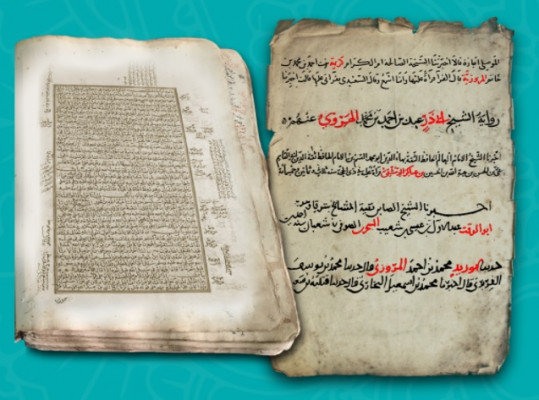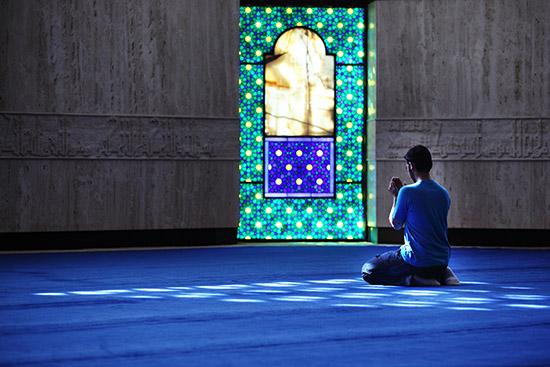Current Section: model

Lesson ﷺ The Sunnah of the Prophet
The Sunnah of the Messenger of Allah ﷺ revelation that Allah revealed to his Prophet Muhammad ﷺ, and alongside the Mighty Book of Allah is the source and foundation of the Islamic faith. The two together are inseparable and a confirmation to the testimony that there is no deity but Allah and the testimony that Muhammad is the Messenger of Allah. And whoever does not believe in the Sunnah does not believe in the Quran.
.jpg)
The Definition of Sunnah
The Prophet Sunnah is defined as what is attributed to the Prophet ﷺ in speech, action, tacit approval and what constitutes a physical characteristic or personality trait.
Status of the Prophetic Sunnah
The Sunnah of the Prophet has a great place in Islam, and its position and status are illustrated by the following:
1. It is the Second Source of Legislation
The Sunnah is the second source of legislation in the religion after the Noble Quran. Al-Miqdam ibn Ma‘di Karib al-Kindi narrates that the Messenger of Allah ﷺ said: «Verily I have been brought the book and something similar along with it. Verily, I have been given the Quran and something similar along with it. Yet the time is coming when a replete man on his couch will proclaim, ‘Keep to this Qur’an; what you find in it to be permissible, treat as permissible, and what you find in it to be prohibited, treat as prohibited» (Musnad Ahmad 17174)
2. It is a Revelation from Allah the Exalted
The Prophet Sunnah is revelation from Allah the Exalted to His Messenger ﷺ. Allah the Exalted says: ﴾Nor does he speak out of his own whim/desire, It is but a revelation sent down [to him]. He was taught by [an angel of] mighty power﴿ (An-Najm:3-5)
3. It is an Explanation of the Quran
The prophetic sunnah contains the explanation of the Quran. Allah the Exalted says: ﴾And We revealed to you the message [i.e., the Quran] that you may make clear to the people what was sent down to them and that they might give thought﴿ (An-Nahl:44).
The verses of the Noble Quran came in many cases with general rulings, which the Messenger of Allah ﷺ explained what was mentioned in the Quran through verbal explanation or practical application. An example of this is the verse where Allah says: ﴾And establish prayer and give zakat and obey the Messenger, that you may receive mercy﴿ [An-Nur:56]. A general order came to establish prayer and to pay zakat, and the explanation and details came in the Sunnah, where the timings and manner of the five daily prayers were explained and all of the rulings pertaining to it. And the detailed rulings of Zakat were similarly explained further in the Sunnah.
The Prophetic Sunnah is part of the divine revelation, the preservation of which Allah the Exalted took upon Himself, as the Exalted said: ﴾It is We who have sent down the Reminder, and it is We who will preserve it﴿ (Al-Hijr:9). Al-Dhikr is a name that applies to everything that Allah has revealed to His Prophet ﷺ from the Quran and Sunnah.

Among the manifestations of this preservation is that Allah, may He be Glorified and Exalted, prepared for Prophetic Sunnah scholars who undertook an enormous effort in order to collect the Sunnah and document it, and set the rules that regulate its narration. They apprehended the lies, delusions, and errors that were included in it, regulating and filtering it with the utmost precision. They committed it to memory in the best way possible, and they closely examined and investigated the details surrounding its narrators and transmission.

Through these narrators and scholars whom Allah utilized to safeguard the Sunnah of His Prophet ﷺ Allah guaranteed its preservation.
The Prophetic Sunnah is the second source of legislation after the Quran, and the religion of Allah the Exalted cannot be complete except by taking both the Book (Quran) and the Sunnah side by side.
.jpg)
The Sunnah is an essential source in deducing legal rulings, and actions must be executed in accordance with it both in matters of theology/belief and legal rulings.
The Sunnah may come to explain the rulings of the Noble Quran, or it may come independent of the Quran to legislate rulings. It is akin to the Quran in allowing what is permissible and prohibiting what is forbidden.
Evidences from the Holy Quran and the Prophetic hadiths prove its legitimacy and its status in Islamic legislation. There are many verses and numerous hadiths that command adherence to the Sunnah, and invoking it, and obligating obedience to the Chosen Prophet ﷺ. The Almighty said: ﴾And take what the Messenger came to you with and leave that which he forbade﴿ [Hashr:7].

Al-Miqdam ibn Ma‘dikarib Al-Kindi narrates that the Messenger of Allah ﷺ said, "Soon there will come a time that a man will be reclining on his pillow, and when one of my Ahadith is narrated he will say: 'The Book of Allah is (sufficient) between us and you. Whatever it states is permissible, we will take as permissible, and whatever it states is forbidden, we will take as forbidden.' Verily, whatever the Messenger of Allah ﷺ has forbidden is like that which Allah has forbidden" (Ibn Majah 12).
Allah obligated people to obey His Messenger ﷺ and follow his Sunnah in his words, actions, and conditions. Allah said: ﴾Say [O Prophet]: If you love Allah, then follow me, for Allah will love you and forgive you your sins, and Allah is Forgiving and Merciful﴿ [Ale-Imran:3]. And Allah the Exalted also said: ﴾And follow him that perhaps you may be guided﴿ [Al-A’raf:158].

Irbad bin Sariyah (may Allah be pleased with him) narrates that the Messenger of Allah ﷺ said: “Adhere to my Sunnah and the Sunnah of the Rightly Guided Caliphs. Hold on to it and hold fast to it. And beware of newly invented matters, for every newly invented matter is an innovation, and every innovation is a misguidance” (Abu Dawood 4607).
Following is adherence to what the Messenger ﷺ said or did, and to follow the methodology of the Prophet ﷺ in complying with Allah's orders, avoiding prohibitions, and applying the religion to your life and acting upon it.
Compliance is obligatory in matters that are obligatory and highly recommended for matters that are deemed highly recommended.
Following the Sunnah has a number of virtues and benefits. From them:

Following the Sunnah will necessitate salvation from following sects, the followers of which the Prophet ﷺ threatened with the Fire. Abdullah bin ‘Amr (may be pleased with them both) narrates that the Messenger of Allah ﷺ said: “What befell the children of Isra'il will befall my Ummah, step by step, such that if there was one who had intercourse with his mother in the open, then there would be someone from my Ummah who would do that. Indeed the children of Isra'il split into seventy-two sects, and my Ummah will split into seventy-three sects. All of them are in the Fire Except one sect." The companions asked: "And which is it O Messenger of Allah?" The Prophet replied: "What I am upon and my Companions" (Al-Tirmidhi, 2641).
The Sunnah necessitates guidance and safety from misguidance. The Almighty said: ﴾And follow it that you may be guided﴿ [Al-A’raf:158]. Abu Hurairah (may Allah be pleased with him) narrates that the Messenger of Allah ﷺ said: “I have left among you two things after which you will not go astray: the Book of Allah and my Sunnah.” (Mustadrak al-Hakim, Hadith 319).

Acceptance of a righteous deed is contingent upon its compliance with the Sunnah. The deed that the servant does must be in accordance with the Sunnah of the Prophet ﷺ. Aisha (may Allah be pleased with her) narrated that the Messenger of Allah ﷺ said: “Whoever does an act that is not in accordance with our command, it will be rejected” (Muslim, Hadith 1718).

Following the Sunnah is affiliation with the Prophet ﷺ. Whoever distances themself from the Sunnah has distanced themself from the Prophet ﷺ. Anas bin Malik (may Allah be pleased with him) narrated: Three people came to the homes of the wives of the Prophet ﷺ asking about the worship of the Prophet ﷺ. When they were informed, they began finding their worship insignificant in comparison so they said: "And where are we in comparison to the Prophet ﷺ? He has been forgiven for his previous and future sins. So one of them said: As for me, I will pray all night long. And another said: I will continuously and not break it. And another said: I will abstain from women and shall never marry. So the Messenger of Allah ﷺ came to them and asked: “Are you the ones who said such and such? By Allah, I fear Allah more than you do, and I am most obedient and dutiful among you to Him, but still I observe fast and break it; perform Salat and sleep at night, and marry women. So whoever turns away from my Sunnah does not belong to me" (Al-Bukhari, Hadith 5063).
The Sunnah leads to salvation from trials and painful torment. Allah the Exalted said: ﴾So let those who go against his [the Prophet's] command beware lest a trial befall them or a painful punishment befall them﴿ [Al-Nur:63].

Following the Sunnah and adherence to it leads to victory and happiness in both worlds. Allah Almighty said: ﴾And whoever obeys Allah and His Messenger and fears Allah and is conscious of Him, then those are the winners﴿ [An-Nur:52].




